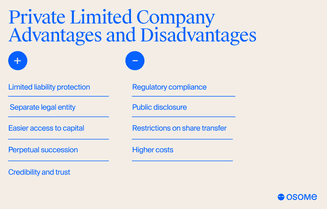Advantages and Disadvantages of a Private Limited Company in Hong Kong
- Modified: 14 April 2025
- 11 min read
- Starting a Company


Heather Cameron
Author
Heather is here to inform and inspire our readers. Boasting eight years in the world of digital marketing, working in diverse industries like finance and travel, she has experience writing for various audiences. As Osome’s resident copywriter, Heather crafts compelling content, including expert guides, helpful accounting tips, and insights into the latest fintech trends that will help entrepreneurs, founders and small business owners in Hong Kong take their businesses to the next level.

Iris Kwong
Reviewer
Iris Kwong is our Corporate Secretary Manager based in the Hong Kong office. With more than 10 years of experience navigating Hong Kong's Companies Ordinance and regulatory requirements, she is our go-to expert on everything from company formation and annual returns to board meetings and shareholder resolutions. She knows the secrets to ensuring smooth business operations and carefully reviews our Hong Kong-focused content, ensuring it's accurate, up-to-date, and packed with useful tips.
Are you considering the private limited company structure for your business? It’s important to understand both the private limited company advantages and disadvantages thoroughly. This article breaks down the key benefits, like limited liability protection and better access to capital, as well as potential downsides, such as regulatory requirements and higher operational costs.
Key Takeaways
- Private limited companies provide various advantages such as limited liability protection, a separate legal entity status, and easier access to capital, making them an attractive structure for entrepreneurs.
- The registration process for private limited companies in Hong Kong requires compliance with specific regulations, including establishing a registered office, appointing at least one director, and maintaining transparency through public disclosure of shareholders.
- Despite their benefits, private limited companies face disadvantages, including extensive regulatory compliance, higher operational costs, and restrictions on share transfers, which may affect overall business viability.
Understanding a Private Limited Company
A private limited company, prevalent in Hong Kong, is a business entity governed by the Hong Kong Companies Ordinance. Unlike public limited companies, private limited companies restrict the trading of their shares publicly, meaning shares are privately held and not available for public trading. This characteristic alone sets the stage for a myriad of advantages and disadvantages.
A private limited company functions as a legal entity separate from its shareholders. The company can own assets, incur liabilities, and enter contracts independently. This business structure provides significant legal and financial benefits, including protecting shareholders’ personal assets because shareholders are only liable for the company's debts to the extent of their unpaid share capital amount, safeguarding their personal wealth from being seized to cover company debts.
Moreover, the company enjoys perpetual succession, meaning its existence continues regardless of ownership changes or shareholders' death. This ensures stability and continuity, which can be crucial for long-term business planning and operations.
The assets and liabilities of a private limited company have a standalone legal identity separating it from its shareholders. This separation prevents the shareholders in private companies from becoming personally liable for company debts clarity in financial management and enhances the entity’s credibility in the eyes of investors and clients.
Private limited companies vs. public limited companies
The core difference between a private and a public limited company is that the latter is allowed to trade with the general public. A public company limited by shares can transfer shares via the stock exchange via open trading, and a public company limited by guarantees can recruit the general public to become guarantors. A private limited company must be traded strictly between private individuals and entities and is rarely listed on the stock exchange unless it goes through specific processes.
Their business structure and functioning purposes also differ. For example, many nonprofit companies would choose to register as public limited companies, whereas commercial enterprises and most businesses, including sole proprietorships, might find registering as private companies far more favourable.
Private and public limited companies are both governed by the Companies Act.
Registration Process for Private Limited Companies
Establishing a private limited company in Hong Kong begins with choosing its own name. The company name must include ‘Limited’ at the end unless a special application is made. Shareholders will then submit the proposed company name, Articles of Association, key personnel information such as the directors and company secretary, and an incorporation form. Shareholders can register a private limited company online. It typically takes about one to five working days to receive the Certificate of Incorporation and a business registration certificate.
The Companies Act requires private limited companies to have a physical registered office address that is not a P.O. box in Hong Kong. You must also assign at least one director and submit your Articles of Association. These steps ensure that the company fully complies with the legal requirements set out by the Companies Ordinance, paving the way for smooth operational beginnings.
Advantages of Being a Private Limited Company
There are various advantages and disadvantages of a private limited company. The limited liability restricted by share capital value is one of the most significant advantages of this business structure. Other advantages include easier access to capital, company name protection, potential tax advantages for shareholders, and more.
Let’s delve into each of these benefits to see how they can impact your business.
Limited liability protection
A private company limited by shares or guarantees provides limited liability, separating shareholder and company liabilities, where a shareholder's liability is limited to the amount they invested in shares. This protection ensures that personal assets remain safe, providing peace of mind and financial security in case of business insolvency.
Separate legal entity
Another crucial benefit is that private companies operate as a separate legal entity. This allows the company to own assets, raise capital, incur liabilities, and enter into contracts independently of its shareholders, highlighting the private limited company advantages.
This separation clarifies the company's legal and financial responsibilities but also protects the shareholders from full liabilities if things were to go wrong. As a result, private companies limited by shares are often regarded as more trustworthy by investors, making it easier to raise capital and its operations more flexible.
Easier access to capital
Private limited companies often have an easier time raising capital compared to other business structures. They can issue shares to new investors, making it easier to attract angel investors and venture capitalists. Additionally, these companies generally find it easier to obtain bank loans, providing more avenues to secure funding for expansion and development.
Perpetual succession
Perpetual succession ensures that the company continues to exist regardless of changes in ownership or the death of shareholders. This continuity is crucial for long-term planning and stability, allowing the company to maintain operations seamlessly.
It ensures that the company’s legal identity status remains intact, providing a stable environment for business growth and allowing it to establish its own legal identity.
Credibility and trust
Adhering to regulatory requirements and transparent financial reporting makes private limited companies more trustworthy among investors than, for example, a sole proprietorship. The trust level which can be a decisive factor in business success.
By maintaining high standards of transparency and compliance, these companies establish a professional and trustworthy business presence.

Disadvantages of Private Limited Companies
While the advantages of private limited companies are compelling, they come with certain disadvantages that potential business owners must consider. From extensive regulatory compliance to higher operational costs, these drawbacks can impact the overall viability of the business.
Let’s explore these challenges in detail.
Regulatory compliance
One of the key disadvantages of a private limited company in Hong Kong is the complicated and strict regulatory compliances. Limited companies and their shareholders are legally required to adhere to particular regulatory requirements. These regulations are designed to ensure compliance within the business framework. They must conduct annual audits, and while small private companies can prepare simplified accounts, the compliance burden remains significant.
Additionally, the company must have at least one director and appoint a company secretary to ensure proper record-keeping and compliance with legal obligations.
Public disclosure
A significant disadvantage of a private limited company is the requirement for public disclosure of shareholders and directors. This transparency can raise privacy concerns as personal information becomes accessible to the general public. While it promotes accountability, it also means that individuals involved in the company must be prepared for a certain level of exposure, such as disclosing annual audited accounts.
Restrictions on share transfer
Unlike public limited companies, a private limited company cannot freely trade its shares via the stock exchange. This is another major disadvantage of private limited companies because it can limit liquidity and flexibility, making it challenging for shareholders to exit the investment or bring in new investors quickly.
Higher costs
Establishing and maintaining a private limited company involves higher costs compared to other business structures. From incorporation fees to compliance costs, these financial burdens can add up.
This higher cost structure may impact overall profitability, especially for small businesses.
Taxation Considerations
Taxation is a critical consideration for private limited companies and there are advantages and disadvantages. Understanding the corporation tax rate and the available tax benefits can significantly impact financial planning and profitability.
Let’s break down the key taxation aspects.
Corporation tax
Private limited companies in Hong Kong are taxed at a standard corporate tax rate of 16.5% on assessable profit. The territorial tax system means that only income generated from local operations is subject to taxation, which is one of the most significant advantages private limited companies offer for companies with international dealings.
The Inland Revenue Department (IRD) administers this tax, ensuring compliance with the tax regulations.
Tax benefits
Private limited companies can benefit from Hong Kong’s two-tiered profits tax system, where the first HK$ 2 million is taxed at a reduced rate of 8.25%. Additionally, companies can deduct allowable business expenses from their taxable profits, further reducing their tax burden.
These tax benefits enhance financial management, allowing companies to reinvest savings into growth and optimise cash flow for long-term stability.
Foreign Direct Investment (FDI) Opportunities
Foreign Direct Investment (FDI) offers significant growth opportunities for private limited companies. With the ability to have 100% foreign ownership holding company shares, FDI is a significant advantage private limited companies can leverage to attract international investors looking for stable and profitable ventures.
Business Name Protection
Upon incorporation, the business name of a private limited company becomes safeguarded, preventing others from registering the same name. Business name protection ensures that the company’s identity remains unique and helps in establishing a distinct brand presence in the market.
Annual General Meetings and Audits
In Hong Kong, private limited companies are required to hold an annual general meeting (AGM) within nine months after the end of their financial year. However, under the Companies Ordinance, a private company, including a single member company, may dispense with the requirement to hold annual general meetings by unanimous shareholders' consent. When AGMs are held, a notice period of at least 21 days is standard, unless all members entitled to attend and vote agree to a shorter notice
All Hong Kong-incorporated companies are required to audit their financial statements annually by a certified public accountant (CPA). These audited financial statements must be presented to shareholders at the Annual General Meeting (AGM).
Ownership and Management Structure
A private limited company's ownership and management structure includes shareholders and directors, with the company secretary playing a crucial role in ensuring compliance with legal requirements.
This structure supports effective governance and operational management.
Shareholders and directors
Shareholders in a private limited company hold ownership stakes and have voting rights on major company decisions. At least one natural person must serve as a company director, responsible for managing the company and ensuring legal compliance. You can assign multiple directors if necessary.
Company secretary
The company secretary ensures compliance with statutory obligations and maintains proper records. The secretary is responsible for managing filings and documentation with regulatory authorities.
Comparison with Other Business Structures
Comparing private limited companies with other business structures like sole proprietorships and partnerships highlights their unique advantages and disadvantages. Private limited companies offer limited liability protection and easier access to capital, unlike sole proprietorships, which have minimal regulatory requirements and costs. However, complicated compliance and heavy administrative burdens are some of the main disadvantages of a private limited company. This comparison helps business owners choose the structure that best fits their needs.
| Aspect | Private Limited Companies 🏢 | Sole Proprietorships 👤 | Partnerships 🤝 |
| Liability | ✅ Limited, personal assets protected | ❌ Owner fully liable for debts | ⚖️ Shared liability, varies by type |
| Capital Access | ✅ Easy to raise funds through shares | ❌ Limited to owner’s resources | 💰 Limited external funding |
| Compliance | ❌ High, audits and filings required | ✅ Minimal, easy to manage | ⚖️ Moderate, some agreements needed |
| Growth Potential | ✅ High, scalable with external funding | ❌ Limited by owner’s capacity | ⚖️ Moderate, based on partners’ input |
Private limited companies also enhance business credibility and attract investors more effectively than sole proprietorships, which rely heavily on personal finances. This credibility and potential for growth make private limited companies a preferred choice for many entrepreneurs in Hong Kong.
Summary
Private limited companies in Hong Kong benefit from many advantages, including limited liability protection, a separate legal entity status, easier access to capital, perpetual succession, and enhanced credibility and trust. They make the private limited company an attractive option for entrepreneurs looking to establish a stable and trustworthy business presence in Hong Kong.
Disadvantages of private limited companies include regulatory compliance challenges, public disclosure obligations, restrictions on transferring the company's shares, and higher operational costs. Shareholders and directors must weigh advantages and disadvantages carefully to ensure their final decision aligns with the long-term goals and operational needs of the business. By understanding these key insights, business owners can make informed decisions that support their growth and success.






